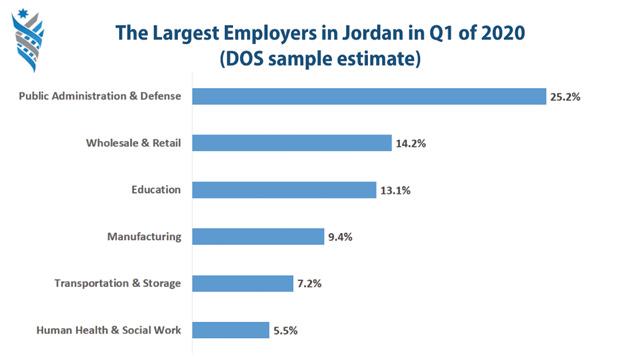You are here
Jordan lags behind on labour productivity — JSF
By JT - Dec 24,2018 - Last updated at Dec 24,2018
AMMAN — The Jordan Strategy Forum (JSF) on Sunday issued a study on the labour market’s productivity rate.
The study, titled “On the Importance of Labour Productivity in Jordan: Where is the Challenge?” reviewed the Kingdom’s productivity rate and the means to boost it.
Strong and consistent economic growth must remain the goal of all Jordanians. To appreciate this challenge, one only needs look at the recent performance of the national economy and its underlying unemployment rates, the JSF said in the study published on its website.
The bottom 20 countries in the world in terms of achieving labour productivity growth rates include eight Arab economies.
While Syria ranked last in the measure, Jordan’s performance has not been encouraging. During the period of 2010-2018, Jordan ranked 116th out of 123 countries. Jordan’s labour productivity deteriorated during this period by -0.783 per cent on average.
Figures in the study showed that the overall labour force participation rate in Jordan between 2015 and 2017 was low, as compared to other countries; where the rate in the Kingdom stood at 39.1 per cent, while the international rate stood at 62.1 per cent.
Women’s participation in the labour force was also low, registering only 14.8 per cent, while the international average stood at 53.9 per cent.
Basic economic sense asserts that higher levels of labour productivity can lead to a myriad of socioeconomic benefits, said the study.
Benefits can include improved competitiveness and trade performance, where productivity growth and lower production costs are keys to firms’ competitiveness in global markets.
Another factor is higher profits, where efficiency gains are an important source of larger corporate profits, and these profits might well be reinvested to support growth of the business sector in the long-term, according to the study.
Another is higher wages: If labour productivity improves, businesses can afford to pay their employees higher wages.
The JSF recommended increasing expenditure on education and raising its efficiency, where the annual expenditure on education in Jordan between 2014 and 2017 constituted 3.8 per cent of the GDP, compared with Japan (8.7 per cent), Austria (9.6 per cent), the UK (12.0 per cent), the US (16.2 per cent) and Switzerland (17.2 per cent).
Related Articles
AMMAN — The growth rate of labour productivity in Jordan has been negative since 2010, the Jordan Strategy Forum (JSF) said on Saturday.In a
AMMAN — COVID-19 has forced Jordanians to adapt to a “new normal” as the lockdown has introduced the government, private sector entiti
AMMAN — The Jordan Strategy Forum (JSF) issued a policy paper entitled, "the amended income tax law in the context of the financial policy i

















